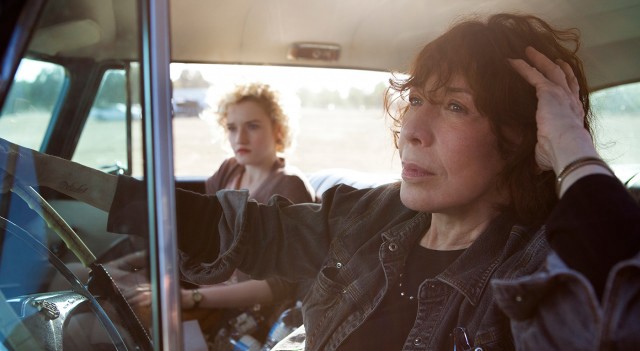SLEEPING WITH OTHER PEOPLE vs GRANDMA: Very Different Lessons About Money

Friends, I saw two movies this weekend. Two! That’s about as many as I managed to see all summer. Both were thought-provoking, funny, well-acted, and smart. But wow did they have different lessons to teach about money.
The first, Grandma, starring Lily Tomlin, is the perfect showcase for a strong character actress who hasn’t gotten to play nearly enough characters lately. Before 2015, her last significant role was as the delightfully cantankerous secretary to President Bartlett in the latter seasons of “the West Wing,” Debbie Fiderer, and her recent career renaissance is richly deserved. Surely you remember her righteous indignation from 9 to 5?
That same anger simmers throughout Grandma, in which Tomlin plays Elle, an acerbic, isolated, too-smart-for-her-own-good West Coast poet/academic still mourning the death of her longtime partner. She hasn’t dealt with her grief, and that causes her to push away anyone else to tries to get too close, including her new girlfriend, played by Judy Greer. Which, come on, how embittered do you have to be to push away Judy Greer?
The one person she cannot reject, however, is her teenage granddaughter, Sage, who comes to her in desperation: she needs $630 for an abortion and she needs it today.
Elle, who cut up her credit cards and made them into a wind chime in protest of our corrupt capitalist system, has under $50 to her name; but she promises Sage that, together, they can figure something out, and they begin on an odyssey — in Elle’s partner’s old car — to get that paper.
The story doesn’t progress along Dog Day Afternoon lines; they don’t attempt to rob a bank. Instead they do mundane, humiliating things we rarely see in films: they grovel, they rage, they try to sell invaluable possessions, and they face up to people from their pasts. The movie shows us, with painstaking, realistic detail, how hard, even impossible, it can be to come up with cash when you’re short; and, at the same time, how having to deal in a straightforward way with often unpleasant facts — as Anna Sale would put it, with death, sex, money — can bring people closer together.
It’s a rough but beautiful movie and I started crying at some point towards the denouement and then couldn’t stop. I mean, yes, it’s a comedy, but be prepared, it’s a dehydrating one, at least if you’re blimped up with pregnancy hormones.
Sleeping With Other People, by contrast, did not make me cry. Whereas Grandma is a rueful though always entertaining trudge through real life, SWOP, a love story set in a fairy-tale version of New York City, hovers a few inches above the ground. None of its characters gets pregnant by accident or has to worry about where to get $600. In fact, these characters seem to spend thousands on lingerie and high-fashion belted trenches, despite the fact that one of our leads — the adorable Alison Brie — is supposed to be a kindergarten teacher.
How does she afford her lifestyle? Is she putting those much fetishized glossy hair extensions on a credit card? If so, we never see her so much as flash the plastic.
Even “Sex and the City” was more upfront about the costs of urban living.
That the realities of commerce are too tawdry for a 2015 sex comedy really says something about where we are today as a society. Whether it’s true or not, Hollywood seems to think that we can handle a graphic, hilarious demonstration of female masturbation techniques using an empty juice bottle, but we can’t handle any acknowledgement of the fact that young teachers don’t make enough to live by themselves in spacious one-bedrooms in brownstone Brooklyn.
At one point, our male lead, the equally adorable Jason Sudeikis, pisses off someone so badly he gets pushed in front of a taxi. At another point, he starts a fistfight in a restaurant and gets hauled off to jail. And how come that doesn’t happen more often in movies? As much fun as it is to watch Hugh Grant and Colin Firth duke it out in Bridget Jones’s Diary, you know that no one can get away with explaining to the bobbies that he smashed with his antagonist through a plate glass window because “It’s Raining Men” started playing in the background and there was the heart of a woman at stake. At the very least, there would be hell, in the form of thousands of pounds, to pay.
My point is, SWOP allows some actions to have consequences, and those consequences are useful: they provide conflict, they move the plot along. As Grandma, and grittier TV shows like “Girls,” “Broad City,” and “Kimmy Schmidt” have shown, the lack of money can be a potent source of conflict too. There’s no reason to shy away from it.
I was charmed by SWOP. I enjoyed the dialogue, the performances, the scene-stealing auxiliary characters. (More Natasha Lyonne in everything, please!) But it was such pure, ridiculous fantasy that I was almost embarrassed on its behalf. It could have benefited tremendously from some frank, hard-won wisdom from Grandma.
Support The Billfold
The Billfold continues to exist thanks to support from our readers. Help us continue to do our work by making a monthly pledge on Patreon or a one-time-only contribution through PayPal.
Comments